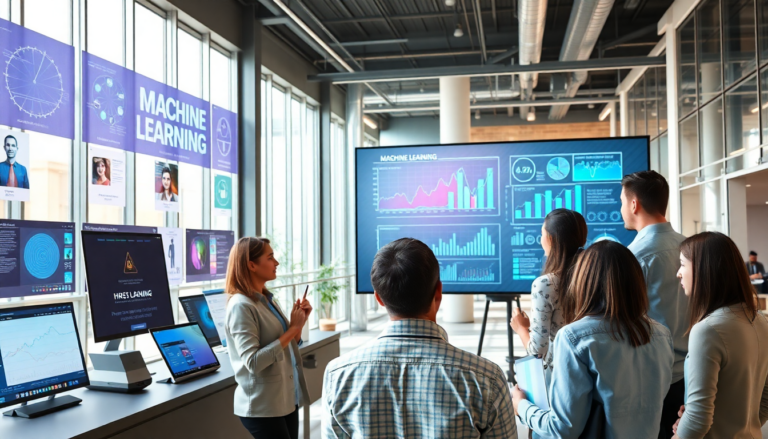Argomenti trattati
Machine learning has emerged as a groundbreaking technology, reshaping industries by simulating human cognitive processes. By utilizing data models to recognize patterns, machine learning enables organizations to make informed predictions and decisions. Its integration spans across numerous sectors, from healthcare to finance, marketing, and even sports. This transformation is not just theoretical; it’s happening right now, influencing how businesses operate and interact with their customers.
Innovations in agriculture with machine learning
Take Scythe Robotics, for instance, which has developed all-electric, autonomous mowers that exemplify the innovative use of machine learning in agriculture. These mowers are equipped with advanced sensors that provide 360-degree perception, enabling them to navigate off-road terrains while detecting and avoiding obstacles. This reduces noise pollution compared to traditional mowers and showcases how machine learning can lead to greener, more efficient agricultural practices.
Enhancing security and convenience in mobile technology
Machine learning is also at the heart of Apple’s Face ID authentication, revolutionizing mobile security. By employing a deep learning framework known as Vision, Apple’s technology can swiftly analyze and recognize the unique features of a user’s face, unlocking devices almost instantaneously. This same framework extends its capabilities to barcode scanning, text recognition, and identifying landmarks, illustrating the breadth of machine learning applications in enhancing user experiences.
Autonomous vehicles and real-time data processing
Waymo exemplifies the application of machine learning in the automotive industry with its self-driving vehicles. These vehicles leverage sophisticated sensors that process data in real-time, allowing them to respond swiftly to various situations, such as stopping at red lights or yielding to pedestrians. This capability not only enhances safety but also represents a significant leap towards the future of transportation.
Revolutionizing cloud services with Amazon Rekognition
Amazon’s AWS platform features Rekognition, a service that employs machine learning to analyze images and videos. It can automatically identify objects, people, and activities, offering businesses powerful tools for data analysis. Additionally, AWS provides free machine learning resources, empowering developers to create customized models that fit their needs, further democratizing access to advanced technology.
Machine learning in language learning and translation
Duolingo has incorporated machine learning into its platform to enhance language learning experiences. By utilizing speech recognition technology, it assesses users’ pronunciation against a database of native speaker patterns, providing personalized feedback. Similarly, Google Translate harnesses machine learning through its Neural Machine Translation system, which continuously learns and improves to deliver more accurate translations over time.
Optimizing e-commerce and personalized shopping experiences
Etsy, the popular online marketplace, utilizes machine learning to tailor shopping experiences, offering personalized product recommendations based on users’ previous interactions. This not only increases customer satisfaction but also drives sales, showcasing how machine learning can transform the retail landscape.
Healthcare advancements through predictive analytics
In the healthcare sector, companies like PathAI employ machine learning to enhance diagnostic accuracy. Their technology assists healthcare professionals in evaluating diagnoses and treatment effectiveness, ultimately leading to more personalized healthcare solutions. Similarly, Strive Health leverages predictive analytics powered by machine learning to improve care for patients with kidney disease, providing timely interventions based on data-driven insights.
Transforming the way we consume media
Netflix employs machine learning through collaborative filtering techniques to analyze user viewing habits. This technology predicts what shows or movies viewers might enjoy, significantly influencing what content is showcased on their homepage. By customizing user experiences, Netflix keeps its audience engaged and satisfied.
Improving financial decision-making
In the world of finance, companies like Capital One utilize machine learning to enhance fraud detection and monitor app behaviors in real-time. This proactive approach helps in swiftly identifying and mitigating threats, showcasing the critical role of machine learning in maintaining security and trust in financial transactions.
Smart marketing solutions
Klaviyo’s digital marketing platform exemplifies how machine learning can personalize marketing strategies. By analyzing past customer behavior, it automates campaigns that resonate with consumers, ensuring brands communicate effectively and meaningfully. This personalization is essential for capturing and retaining customer interest in today’s competitive landscape.
Future applications of machine learning
As we move forward, the potential applications of machine learning seem limitless. From enhancing cybersecurity measures with advanced threat detection to optimizing food service operations at McDonald’s, the technology is continuously evolving. Companies are increasingly recognizing the need for machine learning infrastructure to streamline their processes and enhance productivity. The journey of machine learning is just beginning, and its impact will only grow as more industries embrace its capabilities.

